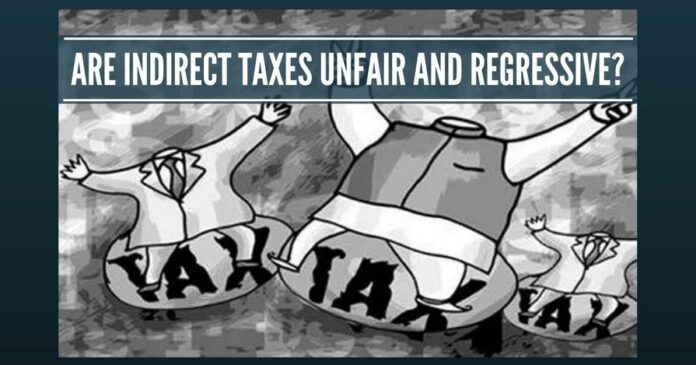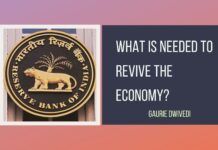
The prosperous, who naturally consume/indulge more, end up paying more indirect taxes
For the longest time, indirect taxes have been demonized for being regressive in nature. A lot of economists in the world (including Indian Finance Ministers P. Chidambaram and Arun Jaitley) recommend countries to move towards higher direct tax (income tax) and lower indirect tax (sales tax, service tax, etc.). They say indirect taxes are regressive since they fall equally on the rich and poor. E.g.: Both the rich and poor pay the same amount of tax when they buy a bag of rice or a litre of petrol (i.e. tax = x% of selling price of product/service), which, they say, is unfair. Taxes should be imposed based on the individual’s capacity to pay. As a matter of principle, the rich/prosperous should contribute a higher share in taxes than the poor.
These levels of indulgence are typically defined by the different income tax brackets/slabs.
While I am in support of the principle that the prosperous should pay a higher share of taxes, I am not convinced with either the argument or the mathematical construct behind the claim “indirect tax is unfair and regressive”. I will try to explain my rationale and refute both, the argument and the mathematical construct, in the coming paragraphs.
We currently attribute ‘income’ to an individual’s capacity to pay taxes. We assume the higher the income, the higher would be their capacity to pay taxes. I think this assumption is incomplete since income is not necessarily a sign of prosperity. Prosperity is what one possesses altogether and is not just a measure of their income in a given year. An individual’s spending behaviour is more accurately related to their prosperity than is their income. E.g.: A prosperous individual who had a bad year in terms of their income may still afford the same luxuries as they did last year. Their loss of income this year does not necessarily affect their spending behaviour. Whereas if they were to lose a major asset (say due to an unfortunate incident), they may end up becoming more parsimonious since they are no longer as prosperous. Hence one’s consumption should be attributed to their prosperity and, by a law of transitivity, one’s consumption should be attributed to their capacity to pay taxes. Therefore, indirect taxes (which an individual pays for their consumption) are not really as regressive as some of us think.
But then the question of unfairness still remains valid, doesn’t it? The rich and poor still pay the same amount of tax on the bag of rice! – Not really. Let us look at the mathematical construct behind this. I call it “The Theory of Indulgence Levels”
Currently, all citizens are considered to have different levels of indulgence in an economy. These levels of indulgence are typically defined by the different income tax brackets/slabs. E.g.: ABC and XYZ are considered to have the same level of productivity (indulgence) for the first Rs. 250 that they earn in a given year. Both of them pay an income tax of 5% on this amount (hypothetically). Yet, the moment ABC earns an additional Rs. 100, his/her level of indulgence in the economy changes and he/she ends up paying 10% tax on that Rs. 100. Further, if ABC earns an additional Rs. 200, he/she ends up paying 20% income tax on that Rs. 200. We have accepted the theory of indulgence levels in taxation from the point of view of income since decades.
If we think about it, indirect taxes also fall within different brackets/slabs. Typically, essential products and services are taxed are the lowest percentage. In fact, sometimes essentials are not taxed at all or are even subsidized on the contrary. That is because, for both ABC and XYZ, an essential is essential. Essentials are the most basic level of indulgence (bracket/slab number one). A prosperous ABC may end up indulging in a more luxurious activity where he/she may end up paying a higher % of tax. Most ‘sin’ goods like alcohol, cigarettes, cars, gadgets, etc. are taxed at very high percentages (highest bracket/slab for the most luxurious levels of indulgence). Clearly, the prosperous, who naturally consume/indulge more, end up paying more indirect taxes.\
According to Dr. Swamy, if India also manages to recover black money stashed abroad, then the duration of income tax relief can go up to two decades.
Hence, saying that indirect taxes are unfair since both the rich and poor pay the same amount of tax on a bag of rice is as ridiculous as saying direct taxes are unfair since both the rich and the poor pay the same amount of direct tax on the first Rs. 250 they earn.
The bigger question is, should a country have only indirect taxes and no direct tax? It depends! Indirect taxes can never substitute direct taxes. We can only have indirect taxes to the extent that the country stays competitive relative to the other countries. The intention of this article was only to refute the myth that indirect taxes are unfair and regressive.
For the question of abolishing income tax – while indirect taxes cannot fully substitute direct taxes, there are tons of other revenue generating methods that a country can implement to substitute direct tax revenues. Countries that are willing to abolish income tax can not only generate revenue from alternate sources but cumulatively they also save a lot of time and effort that goes behind filing/collecting income tax in the first place. If anything, direct taxes are unfair since the poor (since they don’t qualify for the income tax slabs), the rich (since they employ smart Chartered Accountants and/or have other clandestine means), and the agriculturists (since they are exempted regardless of their income) do not pay any taxes. The onus of income tax falls squarely on the salaried/middle class.
World-renowned scholars and economists like Dr Subramanian Swamy have already presented some thought-provoking cases for abolishing the income tax. Dr. Swamy, particularly in the context of India, believes that the loss of revenue for the government as a result of abolishing income tax can be estimated at ~ Rs. 4 lakh crore. This loss of revenue can be recovered just from selling 2G (~ Rs. 4 lakh crore) or coal blocks (~ Rs. 11 lakh crore). With an expected increase in revenue due to Goods and Services Tax (GST), an expected increase in revenue due to asset disinvestment, and an expected reduction in expenditure wastage due to Direct Benefit Transfer (DBT), there is no reason why income tax abolishment cannot be implemented at least for half a decade. According to Dr. Swamy, if India also manages to recover black money stashed abroad, then the duration of income tax relief can go up to two decades.
For reference, below is a table which provides a comparative analysis of individual taxes across some major countries for the year 2016-2017 (all values are in USD).
| India | US | Japan | Singapore | Germany | |
| Nominal GDP (2016) | USD 2.2 Trillion | USD 18.5 Trillion | USD 4.7 Trillion | USD 0.3 Trillion | USD 3.5 Trillion |
| Total Tax Revenue (2016) | USD 0.25 Trillion | USD 3.3 Trillion | USD 0.46 Trillion | USD 0.036 Trillion | USD 0.79 Trillion |
| Individual Income Tax | USD 0.049 Trillion | USD 1.5 Trillion | USD 0.27 Trillion | USD 0.007 Trillion | USD 0.23 Trillion |
| Individual Income Tax as a % of total tax | 20% | 47% | 64% | 20% | 29% |
References:
- All GDP figures: http://statisticstimes.com/economy/projected-world-gdp-ranking.php
- India Total Tax: http://www.livemint.com/Politics/cH5gNYLvx0V4wjPxPsbRzK/Govt-exceeds-201617-tax-collection-target-collects-Rs1710.html
- US Total Tax: https://www.thebalance.com/fy-2016-federal-budget-3882293
- Japan Total Tax: https://www.reuters.com/article/us-japan-economy-budget/japan-2016-17-corporate-tax-revenue-down-in-blow-to-abenomics-idUSKBN19Q0MP
- Singapore Total Tax: http://www.straitstimes.com/business/companies-markets/total-tax-revenue-up-5-per-cent-to-s47-billion-for-full-year-ended-march
- Germany Total Tax: http://www.bundesfinanzministerium.de/Content/EN/Standardartikel/Topics/Taxation/Articles/2016-07-21-tax-revenue-june-2016.html
- India Individual Income Tax: http://www.indiabudget.gov.in/ub2017-18/rec/tr.pdf
- US Individual Income Tax: https://www.cbpp.org/research/federal-tax/policy-basics-where-do-federal-tax-revenues-come-from
- Japan Individual Income Tax: http://www.mof.go.jp/english/tax_policy/taxes_and_stamp_revenues/h201705ae.pdf
- Singapore Individual Income Tax: http://www.straitstimes.com/business/companies-markets/total-tax-revenue-up-5-per-cent-to-s47-billion-for-full-year-ended-march
- Germany Individual Income Tax: http://www.bundesfinanzministerium.de/Content/EN/Standardartikel/Topics/Taxation/Articles/2016-07-21-tax-revenue-june-2016.html
- Dispelling four deleterious assumptions: India-China - October 29, 2020
- Dr. Swamy’s 2002 prediction has come true - October 8, 2020
- Book Review – “RESET: Regaining India’s Economic Legacy” - December 30, 2019











Well written Rishi!
1. I understand the article is about refuting the notion of indirect taxes being unfair. The article also states that indirect taxes can never substitute direct taxes. I agree with both. I am curious, though, about your thoughts on lowering the indirect taxes for a corresponding increase in direct taxes.
2. I am not entirely convinced about the “if anything, direct taxes are unfair…” exclamation for the mentioned reasons. I understand it is written in context, but I’d be cautious of the sentiment. There are three aspects to any administration – policy, implementation/execution, governance. The reasons (e.g. rich evading taxes by hiring smart CAs, etc.) mentioned represent a failure in execution, but that should not influence the reversal of policies; rather they demand to tighten the governance. I’d be uncomfortable if policymakers start defining policies with the premise that “direct taxes are unfair”.
3. Abolishing income taxes sounds awesome to everyone alike! But we need a system for a continuous source of income to the government. Imagine abolishing income taxes for half a decade and then re-introducing. Once a precedence has been set to give out goodies, you will be the most hated person if you try to revoke them! But yes, there are opportunities to lower the taxes – both income and indirect.
P.S> I acknowledge I am not adding value here by offering alternatives/solutions, but merely asking questions.
Good thought provoking article
Withdrawing or reducing direct would politically disastrous. Indian mentality is tuned to thinking that direct tax is levied more on rich and poor are spared. In reality direct tax is paid only by middle class working in organised sector.Almost major income arising from agriculture is not taxed. Direct tax abolition will encourage to earn more and may work as tool to reduce black money. Basically paying taxes either direct or in direct is for nation building and every citizen has to realize and contribute.May be next generation with positive thinking will accept this reality an accept this theory and accept multiple layers indirect tax as final solution.
A good article. Surely worth debating seriously.
One question: If we successfully recover substantial amounts of black money which will offset the Income Tax earnings, surely we can think of abolition of Income Tax, but till then won’t it be a risky proposition, reducing the income to the Government?
An aside: Not taxing poor man’s consumables (or taxing them lightly) and taxing other items based on the wealth-category of the consumer and taxing sin-kind of products higher means we accept multiple GST tax rates, which many people are opposed to. What is the author’s take on this?
Dear Shri Ganesan,
Thank you for your valuable comments!
1) I do believe that individual income tax should be abolished only after a substitute revenue generating activity has been implemented. It should certainly not be abolished in absence of an alternative. Regardless, individual income tax as a % of total tax revenue for India is a comparatively small number, and finding an alternative revenue source and reducing spend on poorly performing schemes should be sufficient to achieve this goal. Also, with more income in hands, the middle class will naturally spend more time in recreation/consumption, in turn increasing indirect tax revenue for the government. A smart finance minister would definitely account for this element. The advantages of abolishing income tax far outweigh the loss in revenue and will do a lot in increasing morale of the tax abiding salaried class.
2) A great point! I am in favor of multiple tax brackets in GST. I am convinced by Arun Jaitley’s arguments in this regard. No matter how loud P. Chidambaram screams that the idea of GST was to have one tax, he will himself never be able to implement this.
Thank you again for your thoughtful comments!!
If prosperous people are indulging in more spending,I would love it for growth of economy !
I count even middle class salaried person in cities as prosperous,because their earning is much more than their need.
Deciding factor is what are the savings in banks ,for which govt has to pay interest.
Govt has to earn this interest and that’s where govt is failing.
It is better to instigate people to spend or cancel the direct tax with reduction of interest rate on bank deposits to less than rate of inflation !!
Whatever may be the case,poor of this country has to be supported,even if they have a habit of Begging !!
Dear Shri Sunil,
Thank you for sharing your views! Yes, I am in total agreement with you. In principle, the prosperous should do more for the less fortunate. I am confident that as a community, we will continue to find better and more streamlined methods to achieve this principle.
Thank you once again!